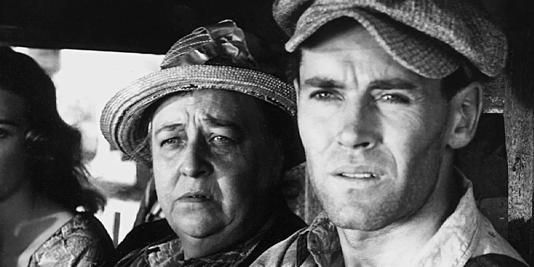The Grapes of Wrath began life in 1939 as John Steinbeck’s Pulitzer prize-winning novel.
A year later, John Ford directed an adaptation that stars Henry Fonda as Tom Joad, a recently released prisoner who leads his family across the States to California after the Great Depression robs them of their farm and livelihood.
One of the most realistic movies, Ford’s take on the novel is a haunting look at a dark time in the country’s early history/
It is buoyed by excellent performances, particularly from Fonda, who earned a best Actor nomination, and Jane Darwell (as Tom’s mom) who won Best Supporting Actress Oscar.
It is also one of the earliest examples of Hollywood representing the voice of the working class.
The Grapes of Wrath was America’s best-selling book of 1939 and 430,000 copies had been printed by February 1940. It won the National Book Award, favorite fiction book of 1939, voted by members of the American Booksellers Association, and the Pulitzer Prize for Fiction.
In 1962, the Nobel Prize committee said The Grapes of Wrath was “great work” and the committee’s main reason for granting Steinbeck the Nobel Prize for Literature.
Time magazine included the novel in its “100 Best English-language Novels from 1923 to 2005” list.
In 2009, The Daily Telegraph also included the novel in its list of “100 novels everyone should read.”
In 1998, the Modern Library ranked The Grapes of Wrath 10th on its list of the 100 best English-language novels of the 20th century.
Screen Version: Differences from Novel:
The film’s first part follows the book fairly closely. However, the second half and the ending are significantly different.
While the book ends with the downfall and break-up of the Joad family, the film switches the order so that the family ends up in a “good” camp provided by the government.
In the novel, Rose-of-Sharon (“Rosasharn”) Rivers (played by Dorris Bowdon) gives birth to a stillborn baby. Later, she offers her milk-filled breasts to starving man, dying in a barn. These scenes were not included in the film.
While the film is stark, it has a more optimistic and hopeful view than the novel, especially when the Joads land at the Department of Agriculture camp.
Also, the producers toned down Steinbeck’s political references, such as eliminating a monologue using a landowner’s description of “reds” as anybody “that wants thirty cents an hour when we’re payin’ twenty-five,” to show that under the prevalent conditions that definition applies to every migrant worker looking for better wages.
The film emphasizes Ma Joad’s pragmatic, forward-looking way of life, despite Tom’s departure, as it concludes with her spiritual “We’re the people” speech.
Ivy and Sairy Wilson, who attend to Grandpa’s death and travel with the Joads until California, are left out of the movie entirely.
Noah’s departure from the family is passed over in the movie. Instead, he simply disappears without explanation. In the book, Floyd tells Tom about how the workers were exploited, but in the movie he does not appear until after the deputy arrives in Hooverville. Sandry, the religious fanatic, is left out of the movie.
The film uses visual imagery to focus on the Joads as a family unit, whereas the novel focuses on their journey as part of the “family of man.” Their farm is not shown in detail, and the family members are not seen working in agriculture. This serves to focus the film on the specific family, as opposed to the novel’s focus on man and land together.
In the film, most of the Joad family members are reduced to background characters (Al, Noah, and Uncle John) or to being the focus of only one or two minor scenes (Rose-of-Sharon and Connie). Instead, the film is concerned with Tom, Ma, and Jim Casy.











